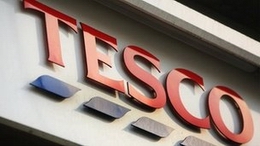
Tesco already spends around £500m a year on NI-sourced produce.
The move will mean the amount of Northern Ireland-sourced meat will rise from 20% to 90% in the company's local supermarkets.
Mr Clarke is opening a new institute for global food security at Queen's University.
He said the horsemeat scandal had been a wake-up call for the whole industry.
Mr Clarke said customers now wanted to know where their meat came from.
"I think when all the inquiries are completed, it is going to be very clear that there are elements in the supply chain who are seeking to adulterate products of all suppliers, all retailers, and all manufacturers," he said.
"The work that everyone is doing now is to make sure that can't happen again, by implementing the most comprehensive DNA testing regime that's been seen in the world."
Agriculture minister Michelle O'Neill welcomed Tesco's decision to increase the amount of locally sourced meat.
"In light of falling farm incomes, high feed costs and the fallout from the recent horsemeat controversy, this news from Tesco that it is to greatly increase the amount of fresh meat it sources locally will be welcomed by farmers across the north.
"I would urge the other major supermarket retailers to follow the lead set by Tesco and increase the amount that they source locally."
During his speech, Mr Clarke also described a new world where greater global demand for quality food was shifting power towards suppliers.
The Institute for Global Food Security (IGFS) is aimed at improving food safety around the world.
QUB has invested over £33m in the IGFS, which will play a key role in improving the integrity of the food chain.
It comes in the wake of the horsemeat controversy that led to investigations into the food supply chain.
'Future food leaders'
Prof Chris Elliott, director of the new institute, said: "We want to build a food-fortress, ensuring everything we import is of the highest quality and that what we sell locally and internationally is also 100% safe, nutritious and authentic.
"This new institute will ensure that we can continue to recruit the best students into our food programmes, creating the food leaders of the future who have been trained in one of the world's best-equipped research laboratories."
The production and processing of food plays a critical role in the Northern Ireland economy, with the sector providing 85,000 jobs and generating sales of £5.2bn each year.
Retail analyst Dr Clive Black said the food industry was the most important sector in the Northern Ireland economy.
"The Northern Ireland economy is under some pressure, government funding is going to go down, so it's more important than ever that the food industry in this region, is competitive, innovative, and it's entrepreneurial," he said.
"Today is all about those things and bringing Philip Clarke here and opening a world class institute, I think shows the Northern Ireland food industry at its best, and it has to build on that."





